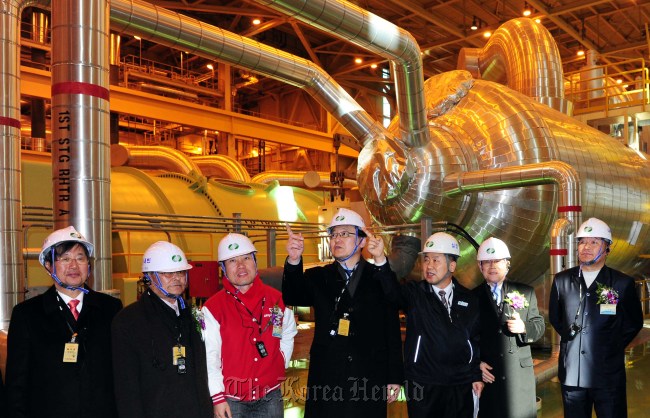A belated ceremony to celebrate the completion of the Shin-Gori nuclear power plant units 1 and 2 was held near the site, located in Gijang, Busan, on Tuesday.
Despite the completion of unit 1 in February 2011 and unit 2 in July this year, the ceremony had been delayed due to opposition against operations by local citizens and safety concerns raised by a recent controversy over the usage of substandard parts in other nuclear reactors.
The two newly built nuclear plants each with a capacity of 1 million kilowatts had attracted wide attention from the local and international nuclear power communities at the beginning of construction for adopting the improved Korean standard nuclear power plant model.
 |
Knowledge Economy Minister Hong Suk-woo (center) looks around Shin-Gori nuclear power plant after attending a ceremony for the structures’ completion in Busan on Tuesday. (Park Hae-mook/The Korea Herald) |
The Ministry of Knowledge Economy, which is responsible for the nation’s energy policy, cannot further delay the announcement of completion as power reserves are expected to soon fall short of demand, in part due to the recent shutdown of two reactors in Yeonggwang County, South Jeolla Province.
The nation’s 23 nuclear reactors, including the two Shin-Gori nuclear power reactors, produce around one-third of the entire power supply.
Knowledge Economy Minister Hong Suk-woo attended the ceremony to meet local citizens and explain the government’s nuclear power policy in a bid to ease their safety concerns.
“Success of the nuclear power plants depends on public trust. The government will make all-out efforts to restore it,” he vowed.
Despite the ministry’s efforts, some local citizens took to the streets to oppose the two nuclear power reactors situated in their neighborhood.
The conflicts over nuclear power plants might continue as Korea will add 11 reactors in the near future, industry watchers say. They forecast the year 2013, which is to see a new president, will be a watershed year to decide the direction of the nation’s nuclear policy.
Regarding the nuclear power-related policy, two main presidential candidates take a different stance. The ruling Saenuri Party’s Park Geun-hye stresses a policy on the safety of nuclear power plants, but she does not oppose additional construction of nuclear power plants.
The opposition Democratic United Party’s Moon Jae-in has said that if elected, he will not build additional nuclear power plants and instead increase the share of renewable energy sources in the nation’s energy supply.
Public concern about the safety of nuclear power plants spiked after Japan was hit hard by the nuclear disaster in Fukushima in March last year.
By Seo Jee-yeon (
jyseo@heraldcorp.com)








